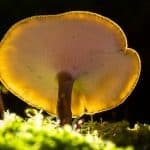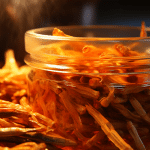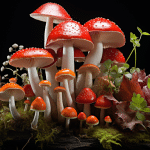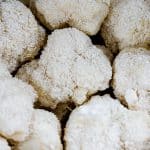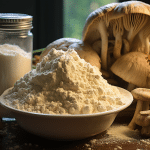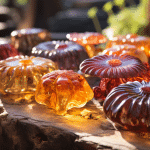We receive many questions regarding the benefits that medicinal mushrooms may offer diabetics. After reviewing recent studies on this subject, we have put together this list of adaptogenic mushrooms that diabetics (and everyone for that matter) can benefit from. Read on to take a deeper look at the best mushrooms for diabetes, and how they may be helpful in maintaining your health.
What is Diabetes?
Diabetes (diabetes mellitus) is a chronic autoimmune disorder that impacts the ability of your body to convert food, specifically carbohydrates and sugar, into energy. A healthy body breaks carbohydrates into sugars and releases these sugars into the bloodstream. Then, the pancreas releases insulin, a peptide hormone, which allows your cells to take in sugars and use them for energy.
People with diabetes either do not make enough (or no) insulin, or they have difficulty using the insulin correctly, depending on their diabetes type. Patients with type 1 don’t make any (or any) insulin, and patients with type 2 make some, but the body cannot use them well (they become insulin resistant). So the sugar cannot enter the cells and give energy to the body.
Symptoms of Diabetes
Newly diagnosed diabetes (especially Type 1 diabetes in children) presents with increased hunger and thirst, frequently urinating, dry skin, and weight loss. All these symptoms go away once the person starts taking insulin. However, if an individual who has this condition does not monitor his or her diabetes care or limit sugar intake, he or she may experience long-term complications, like.
- eye issues
- slow wound healing
- nerve pain
- nerve damage
- skin infections and kidney issues
- diabetic ketoacidosis
Typical Diabetes Treatment Options
People living with diabetes must monitor their diets and use diabetes medications to manage the disease. A diabetics diet is low-carb (avoiding foods that are high on the glycemic index is essential) and low-calorie, because weight gain aggravates symptoms of diabetes.
Diabetes treatment also includes continuous glucose monitoring and insulin shots. Some diabetes patients choose to use an insulin pump, which is a device that monitors your blood glucose levels and pumps insulin into your body when it is needed.
Can Functional Mushrooms Help With Diabetes?
Yes, different types of medicinal mushrooms appear beneficial in managing diabetes. Mushrooms are typically low in calories and carbohydrates, while being high in antioxidants, vitamin B12, and protein.
List of The Best Mushrooms for Diabetes
Lion’s Mane Mushroom
Lion’s Mane (Hericium erinaceus) is a type of edible mushroom used for centuries in traditional Chinese medicine. This mushroom is frequently praised for its cancer-fighting abilities and benefits for general mental health. However, compounds found in Hericium erinaceus have also shown anti-diabetic potential, and the mushroom appears to improve blood sugar levels and protect against neuropathy, a common symptom of chronic diabetes.
The Hypoglycemic Potential of Lion’s Mane Mushrooms
Several studies have suggested that extracts from Lions Mane mushrooms can reduce glucose levels. For instance, one in vitro study investigated the effects of Hericium erinaceus on blood sugar levels. The lions mane fruit bodies had a-glucosidase inhibiting activity, meaning that they showed potential for lower blood sugar levels.
An animal study conducted in 2013 came to a similar conclusion. Researchers examined the effects of Hericium erinaceus in diabetic rats. The results showed that the mushroom improved blood sugar levels, at least for animals who had diabetes, after 28 days of use.
Lion’s Mane and Diabetic Neuropathic Pain
Taking supplements with Lions Mane mushrooms can be helpful in improving symptoms of diabetes, like nerve pain. One study investigated the effects of Hericium erinaceus on diabetic neuropathy in lab rats. The results showed that lions mane extract might offer relief from pain and help treat diabetic neuropathy, at least in animals.
Chaga Mushroom
Chaga mushrooms (Inonotus obliquus) are among the healthiest mushrooms that can be consumed. It is been shown to help with cancers (particularly liver cancers and digestive system tumors) and appears to improve insulin resistance in diabetics. According to animal studies, Chaga mushrooms appear to have amazing anti-diabetic properties.
A 2017 study investigated the effects of the Inonotus obliquus polysaccharide on diabetes caused by streptozotocin in diabetes mice, as well as potential mechanisms for its anti-diabetic effects. Mice were fed high-fat diets and given 900 mg of chaga extract. The researchers examined the effects of Inonotus obliquus polysaccharide on the blood glucose levels at rest, which decreased substantially following administration of the chaga.
Although more studies are needed, activation of the PI3K-Akt pathway may be the potential mechanism for chagas hypoglycemic effects. This pathway contributes to metabolism and cellular growth, and damage to it is strongly associated with type 2 diabetes.
Reishi Mushroom
Reishi mushrooms (Ganoderma lucidum) are known for their cancer-fighting benefits, being among the best mushrooms to consume to treat bladder cancer. But, did you know that the mushroom has amazing anti-diabetic potential, too. Reishi mushrooms seem to enhance insulin resistance, according to a 2019 research review. This review study investigated the anti-diabetic potential of mushrooms in the genus Ganoderma, focusing specifically on Ganoderma lucidum. Reishi mushrooms improved insulin resistance in obese diabetes mice after four weeks of administration.
Ganoderma polysaccharides seem to stabilize insulin levels through regulation of liver glucose regulator enzymes (hepatic enzymes that regulate blood glucose levels).
Learn more: Can you freeze mushrooms?
Oyster Mushroom
Oyster mushrooms may have some pretty good benefits for diabetics. Due to its high protein and low carbohydrate content, this mushroom does not cause your insulin levels to rise. A study on humans looked at the anti-diabetic potential of Oyster mushrooms.
Eighty-nine subjects with diabetes were given oyster mushroom extract for one week, then stopped for one week, then given the extract again for one week. The results showed significantly lower blood glucose levels over the two weeks that subjects took the extract. This calls for more studies on oyster mushrooms potential in improving insulin sensitivity and lower blood glucose levels.
Maitake Mushroom
Grifola frondosa (Maitake Mushroom) is an adaptogenic, low-calorie mushroom known for its hypoglycemic potential. In addition to its ability to reduce blood sugar levels (at least in animals that are diabetic), maitake mushrooms seem also to mitigate immune-function problems associated with diabetes. A 2015 study compared the effects of grafica frondosa in both diabetic and non-diabetic mice. While healthy mice did not experience any significant changes in their blood glucose levels, the fungus from maitake mitigated blood glucose increases after meals for diabetic mice.
Learn more: Healthiest mushrooms
Cordyceps Mushroom
Cordyceps is a powerful medicinal mushroom, frequently touted for its benefits to cancer patients as well as energy-boosting potential. Anecdotal evidence and scientific studies show this mushroom may also help with blood sugar control and reduce the incidence and severity of diabetic nephropathy, a common side effect of diabetes.
Although further research is needed on humans, cordyceps mushrooms seem to stabilize glucose metabolism in animals. Both cordyceps militaris and cordyceps sinensis offer anti-diabetic activities that may benefit prevention and management of diabetes.
Cordyceps Militaris Helps Glycemic Control
Cordycepin, the compound found in cordyceps, appears to reduce blood glucose levels in diabetic mice that were treated with alloxan. A 2015 animal study investigated cordyceps militaris hyperglycemic effects. Mice given a cordyceps extract in water had lower blood glucose levels than mice who did not receive the treatment. These results indicate that cordyceps, specifically, has a beneficial effect on glucose uptake, and may be used as a therapeutic agent for the treatment of diabetes.
Cordyceps Mushrooms and Blood Sugar Levels
Animal studies have investigated hypoglycemic activities of polysaccharides found in cultured cordyceps mycelium. After taking a sample of cordyceps sinensis extract for one week, the serum insulin levels in diabetescytic rats and mice were higher, suggesting their pancreas was capable of producing more hormones.
Does Cordyceps Help With Diabetic Nephropathy
According to Diabetes Research, diabetic nephropathy is the most common complication of diabetes. Taking a Cordyceps supplement may reduce the chances that you will have kidney problems from diabetes.
A 2016 study investigated the effects of the militaris powder of Cordyceps on renal function of rats suffering from type 2 diabetes mellitus. The powder combined the beneficial compounds found in Cordyceps fruiting bodies and the mycelium. After 8 weeks treatment, the biomarkers of kidney dysfunction were greatly alleviated, suggesting cordyceps may exert potent renoprotective effects in the setting of diabetic nephropathy.







